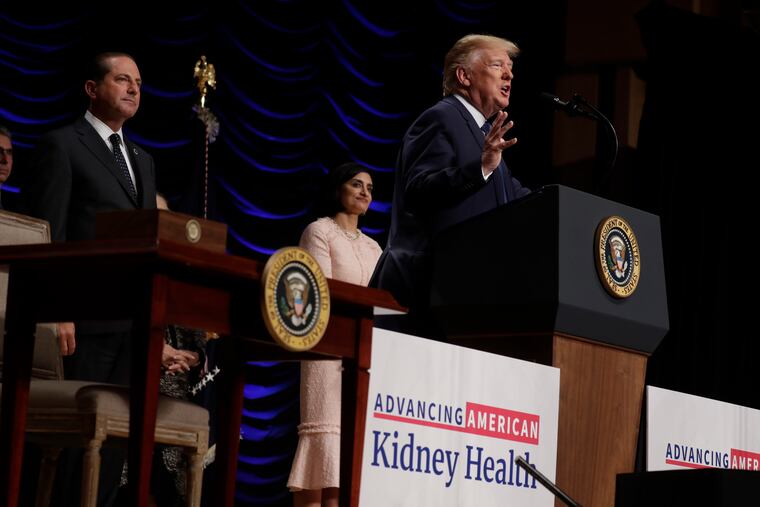Trump administration finalizes rule that could make thousands more organs available for transplant
The Trump administration has finalized major reforms in the way organs are collected and distributed for transplant, an effort to make thousands more kidneys, livers, hearts and lungs available.

WASHINGTON - The Trump administration has finalized major reforms in the way organs are collected and distributed for transplant, an effort aimed at making thousands more kidneys, livers, hearts and lungs available to the lengthy list of people waiting for them.
The changes, announced Friday evening, are aimed primarily at "organ procurement organizations," the government-chartered network of 58 nonprofits that collects organs from deceased donors and rushes them to surgeons at transplant centers.
Critics, and occasionally the government, have contended that some OPOs have for years fallen far short of the number of organs they could be collecting, getting by because each enjoys a monopoly on a government-designated piece of territory and reports its own data to the Department of Health and Human Services. That has made it easy for some to manipulate the numbers their performance is judged on.
That will change under the new rules.
"There are few more transformative interventions for someone's health than an organ transplant, but thousands of Americans are deprived of this lifesaving opportunity every year by a broken system," Health and Human Services Secretary Alex Azar said in a statement. "By making overdue reforms to hold organ procurement organizations accountable, we're giving thousands of Americans waiting for organ transplants a chance at better, longer, and healthier lives."
About 113,000 people are on the waiting list for kidneys, livers, hearts, lungs, pancreases and intestines. Many wait years for an organ and about 20 die each day, according to government figures.
HHS estimates that about 5,600 more organs could be collected for transplant each year under the new policies.
"This is a before-and-after moment for our industry," said Diane Brockmeier, past president of the OPO trade group and CEO of Mid-America Transplant in St. Louis, Mo. "Objective reporting will bring much needed clarity, and ensure that the best among us continue to earn the privilege and responsibility of serving patients."
Greg Segal, co-founder of Organize, which formed in 2013 to fight for changes to the transplant system, called the rule "an unequivocal win for patients."
"OPOs have been unaccountable for decades, and too many patients - including in my own family - have died as a result," said Segal, whose aunt died last year while waiting for a heart. "This is the first real hope that waiting list patients have had in a long time."
Under the new rules, OPOs will be independently evaluated by the Centers for Medicare and Medicaid Services on objective data from the Centers for Disease Control and Prevention that provides easier comparison.
The new measurements will encourage OPOs to pursue all potential deceased donors, even those who have only a single organ to give. In the past, some OPOs had been reluctant to invest substantial time and effort engaging with the families of donors unless multiple organs were available.
"We cannot improve what we cannot measure, and the current system of allowing OPOs to self-report their own performance data confounds accurate measurement - and too often, meaningful improvement," kidney transplant surgeon Michelle Josephson, chair of the American Society of Nephrology's policy and advocacy committee, said in a statement.
Sen. Todd Young, R-Ind., who introduced legislation to increase oversight of OPOs in 2019, said the new rules "will finally ensure that these organizations are held accountable and subject to metrics that are clear and verifiable."
Progress could come by collecting more organs from older donors with less than perfect organs that some OPOs have avoided and transplant surgeons have rejected to keep their success rates high. A Washington Post analysis last year found that as many as 27,000 people met the criteria in 2016 for organ donation - more than twice the number of actual donors. The vast majority of untapped donors were older than 50.
Lower-performing OPOs also face closure and takeover by better ones, beginning in 2026, after a four-year cycle of evaluating the OPOs under the new system. No OPO has been closed for poor performance in more than two decades.